#ospd
Text
Masochistic / Self-Defeating Personality Disorder (Ma/SDPD)
Note: You cannot be diagnosed with this disorder, as it's not in any diagnostic manual; you would be diagnosed with Other Specified Personality Disorder instead.
Criteria from the DSM-III-R (1987):
A. A pervasive pattern of self-defeating behavior, beginning by early adulthood and present in a variety of contexts. The person may often avoid or undermine pleasurable experiences, be drawn to situations or relationships in which he or she will suffer, and prevent others from helping him or her, as indicated by at least five of the following:
chooses people and situations that lead to disappointment, failure, or mistreatment even when better options are clearly available
rejects or renders ineffective the attempts of others to help him or her
following positive personal events (e.g., new achievement), responds with depression, guilt, or a behavior that produces pain (e.g., an accident)
incites angry or rejecting responses from others and then feels hurt, defeated, or humiliated (e.g., makes fun of spouse in public, provoking an angry retort, then feels devastated)
rejects opportunities for pleasure, or is reluctant to acknowledge enjoying himself or herself (despite having adequate social skills and the capacity for pleasure)
fails to accomplish tasks crucial to his or her personal objectives despite demonstrated ability to do so, e.g., helps fellow students write papers, but is unable to write his or her own
is uninterested in or rejects people who consistently treat him or her well, e.g., is unattracted to caring sexual partners
engages in excessive self-sacrifice that is unsolicited by the intended recipients of the sacrifice
B. The behaviors in A do not occur exclusively in response to, or in anticipation of, being physically, sexually, or psychologically abused.
C. The behaviors in A do not occur only when the person is depressed.
Millon's subtypes:

(Millon, ed.).
About Ma/SDPD
Ma/SDPD is similar to avoidant, dependent, obsessive-compulsive, depressive / melancholic, negativistic / passive-aggressive and borderline PDs. It's part of what Millon & Bloom term the "Compliant Personality Patterns", along with OCPD, DPD & HPD.
Differential diagnoses include ongoing abuse, anxiety disorders, somatic disorders, and mood disorders.
The most common PD comorbidities with Ma/SDPD are AsPD (22.17%), Depressive / Melancholic PD (16.74%), & SzPD (12.22%). The least common was HPD (4.07%). Less than 8 percent (7.24%) had only ("pure") Ma/SDPD [much higher than those who had pure Negativistic / Passive-Aggressive, Depressive / Melancholic and Sadistic PDs] (Millon & Bloom).
Millon defines it on a spectrum from aggrieved -> masochistic (self-defeating) (Millon Personality Group); or alternatively from abused [personality type] -> aggrieved [style] -> self-defeating [disorder] (Millon). It also exists on a spectrum from self-sacrificing -> yielding -> masochistic (Millon, ed.).
Originally called masochistic PD, the name was changed to self-defeating PD in the DSM-III-R "to avoid the historic association of the term masochistic with older psychoanalytic views of female sexuality and the implication that a person with the disorder derives unconscious pleasure from suffering" (DSM-III-R). However, Millon & Bloom write that the specific name chosen is pointless, because "all personality disorders are “self-defeating.”"
Childhood trauma is a predisposing factor (DSM-III-R).
Herman argues that Ma/SDPD is a misdiagnosis of Complex PTSD, due to victim blaming and sexism (she also argues the same for Dependent and Histrionic PDs).
In the DSM-III-R it was described as being characterised by “ubiquitous self-defeating behavior such as repeatedly entering into unsatisfying and hurtful relationships, avoiding opportunities for pleasure, rejecting relationships with seemingly caring people, and repeatedly rendering ineffective reasonable efforts by others to help the person" (Coolidge & Segal).
Ma/SDPD "is a mixing or confusion of the usual pleasure-seeking drive with the pain avoidance. As a result, these individuals appear to create personal and social discomfort in their lives. Although it is often reported that they seem to feel comfortable only with guilt and shame, they are also believed to use their self-deprecation as a social strategy to gain support from others" (Millon & Bloom).
In Ma/SDPD, "the individual experiences what is emotionally painful as a means of fulfilling his or her survival aims" (Millon, ed.).
Ma/SDPD only ever appeared in the appendix of the DSM-III-R, and it was dropped because it was associated with 'feminine sexual submissiveness' (Millon, ed.).
References
Coolidge, Frederick L., & Segal, Daniel L., ‘Evolution of Personality Disorder Diagnoses in the Diagnostic and Statistical Manual of Mental Disorders’, Clinical Psychology Review, 1998, vol. 18, no. 5, pp. 585-599.
Herman, Judith Lewis, Trauma and Recovery, 2015.
Millon, Theodore, & Bloom, Caryl, The Millon Inventories, 2008.
Millon, Theodore, Disorders of Personality, 2011.
Millon, Theodore, ed., Personality Disorders in Modern Life, 2004.
'Aggrieved / Masochistic Personality', Millon Personality Group, 2015, https://www.millonpersonality.com/theory/diagnostic-taxonomy/masochistic.htm.
#masochistic personality disorder#self defeating personality disorder#self-defeating personality disorder#other specified personality disorder#ospd#personality disorders#pd info#long post#dogpost#dsm-iii-r#dsm iii r#dsm-iii#dsm iii#described#described in alt text
27 notes
·
View notes
Text
OSPD is a nightmare
3 notes
·
View notes
Text
Devlin: I really love your personality-
Cian: thank you, it took four disorders to achieve it!
#cian has npd bpd ppd & ospd#cian lynch#devlin doherty#cian x devlin#hellcrew#incorrect quotes#incorrect hellcrew quotes
4 notes
·
View notes
Text
been seeing interest crop up for a plural interpretation of grey wind/chasing wind, or making plural iterator ocs. this is great! as a system myself, i would like to offer some guiding questions and tips to non-systems to help out in their endeavors. please remember that i am one system and plurality varies VERY HEAVILY among people. other systems are free to comment and add their own tips. just dont turn this post into syscourse
i will use gw/cw as the most prevalent examples but this applies to any oc as well!
- alters are their own people in a lot of cases, not just "personalities". ask yourself, how does gw differ from cw? when presented with the same situation, how do each of them react? do they agree with each other or not? either way, what are their reasons?
- systems are rarely comprised of just two alters. it is not impossible, but very rare. most people notice plural symptoms at around 3 alters and people will on average have between 8-15 alters (but more is very much not unheard of!). think about how many alters gw/cw would have on top of each other
- alters may have different pronouns, sexuality, and ways they want to present themselves from each other. how do gw/cw and other alters differ from each other in this way, if at all?
- if gw/cw's physical body changes to represent who is fronting, was this an ability they had before realizing their plurality? in our world, we cannot change how we look outside of clothes and makeup. if gw/cw do not possess the ability to change physically, do either of them or any other alter feel uncomfortable or even dysphoric looking at their physical body?
- alters' relationships may vary heavily on the same person. how do gw/cw feel about a specific person? how are they the same or different? is one alter in a whole different kind of relationship with someone than another?
- how comfortable is gw/cw with telling others about their plurality? do only they know? their close friends? local group? anyone they come across? plurality is often personal, and is not a singular decision for any one alter in a system to make to tell others. it can be difficult for non-systems to understand what plurality is like (and in our world, cause mockery) so they may think it is easier to stay quiet about it
- plurality happens because of several different conditions. there is did, but there are also ospd-1a and 1b. i would highly recommend doing your own research on these different types of plurality. they each have different effects on memories, emotional state, even how defined the alters themselves. again, look into it
- if gw/cw have memory problems, do they have a way to get around it? private broadcasts? pearls? scratching on the walls? how do they talk to alters not co-concious with them?
- some systems may use role labels to identify themselves as having particular jobs to help/protect the system. these are roles such as host, caretaker, guardian, traumaholder, etc. do your research on this one. do any of these roles apply? or do gw/cw forgo these labels? (personally, we only use the term "host")
- headspace is a place in the mind where alters "live" (it's not a real residence, but it feels that way) headspace may be small, only representing co-conciousness, or very large, giving every alter a more "tangible" place to stay if not fronting. or headspace might not exist at all! (this is most common in systems who just found out about their plurality). what does headspace look like to them? keep in mind, headspace can really look like anything. for me at least, it looks mostly consistent. a few things may change about it or it may expand, but it's not like imagination where anything happens if you think about it
as a disclaimer i am not going to go in depth about trauma or sources in this post. it can get very personal very quickly. a general way i can put it is think of a long term source of stress and/or abuse that may be present in your iterator's life. handle the subject with care.
the best way to learn about the experiences of plurality is to ask people who are systems. as long as you are given consent, come in with genuine curiosity, and be as reasonable as you can, most systems will be okay with questions! it is like any other identity
a side: other ways to make plural iterators?
iterators do not share human anatomy or physiology. they will never perfectly be able to represent plurality like we have it in our world
but the unique characteristics of iterators can lend way into creative ideas that are similar to plurality! (but never, i want to stress, NEVER the same)
notably, several puppets in one can. if you remember that the body of the iterator is the structure, and the puppets are like the face, then you have several faces, personalities, people, in one body. my immunerators play around with this idea and i am sure there are other ways to get creative!
#rain world#broadcast.txt#gw#headcanon#my askbox is also open for questions#only if it relates to gw/cw or any other iterator oc you want help with plurality for#and not to pry into my personal life#i am a rain world blog. not a system blog#i wanted to offer some help to this part of the community#i will block anyone who gets weird about me or this post
151 notes
·
View notes
Text
I am an adult (under 25). Any pronouns except it/its.
I am severely disordered and extremely blunt. I struggle with a wide variety of "ugly" /socially unacceptable symptoms which I will talk about on this blog. I am terrified of people but I appreciate mutual interaction <3
I am medicated and in therapy with a dissociative specialist. I focus heavily on my recovery and I'm lucky to have a very strong support system.
I vent/rant about being a victim of SRA/CRA, Sex trafficking/CSA, TBMC/programming, neglect, forced perpetration. Trigger warning for all of these on this blog. Graphic posts will have warnings but general ones won't.
MINORS, PRO ED/SH, NSFW BLOGS, RADQUEER, PRO/COMPLEX CONTACT, ISREAL SUPPORTERS, TERF/GENDER CRITICAL, RIGHT WING DNI! I block very liberally even if you're not on this list, no one will annoy me on my own blog.
I am transgender and queer - labels tend to vary based on alter.
I alternate between I/we, system/pwDID, and alter/part language. Never refer to us as headmates, you&, plural or multiple.
I am medium support needs autistic with C-DID, GAD, Agoraphobia, MDD, and CPTSD which are all professionally diagnosed. I suspect OSPD with NPD, HPD, PPD, AVPD traits. I have several physical disorders as well. I am disabled and have a caretaker.
I like writing, worldbuilding, scrapbooking, colouring, psychology, witchcraft, JJBA, Persona 5, Sylvanian Families, LPS, Sanrio, Muse, Melanie Martinez, Twenty One Pilots and Hamilton.
I am pro educated self diagnosis, pro the right to die and supportive of paraphiles who are anti contact. I am psych critical, an intersectional feminist and a socialist. I really enjoy discussions about these topics!!
I am against the censorship of fiction however we need to consume media critically. I believe fiction can be a healthy way of coping however I consider myself ship neutral because there is issues with both sides of this. I am also neutral in syscourse and queer discourse, if it's not harming people then I don't care.
2 notes
·
View notes
Note
can I ask.. what happens if someone has the experience of splitting, a fp, and jealously/I guess fear of abandonment.. but can’t quite meet the criteria for bpd? mainly bc you have symptoms that could be explained by other disorders u have but the ones above aren’t and those are like the biggest parts of bpd. if u have a symptom that could be explained by another disorder u already have, how can u rule it out and say it is or isn’t from bpd(or whatever disorder one is questioning). Do u have any thoughts?
If you have significantly impactful or distressing personality symptoms and you don't meet the criteria for any specific personality disorder, you would likely be diagnosed with Other Specified Personality Disorder (OSPD).
As for the second part of your ask, it can be very hard to differentiate between specific traits of different disorders, especially when trauma is concerned. My best advice with trauma disorders such as BPD versus developmental disorders such as autism is to 1) get out of the situations that are making your symptoms worse (this does not mean isolating yourself, it means attending therapy and working on symptom management) and 2) working to find the root causes of your symptoms (e.g., if your mood swings are caused by sensory issues or social upset it's more likely that the root cause is autism than BPD).
If you have a professional you can consult about this, I highly suggest going over it with them. Psychologists and psychiatrists are trained to determine the smaller differences between disorders.
I hope this helps!
7 notes
·
View notes
Note
You must be in a tumblr bubble because how have you never seen posts with thousands notes claiming most classical literature is actually fanfiction of bible and the rest is of mythology. Like, this isn’t a hot take on tumblr, unfortunately.
Probably because I have a life outside of tumblr and curate my experience, but yes, I have seen posts about how Paradise Lost is just Bible fanfic and Dante's Inferno is self-insert fanfiction, but mostly from people who watch OSPD videos and say it as a joke. It's a major simplification of about a dozen concepts but okay, if you look at it from the point of definitions, yeah, Paradise Lost & the Divine Comedy are technically fanfiction; they are based on pre-existing work, with Dante there's irl people in scenarios they've never been in, etc etc.
Although I have never seen anyone saying any particular fanfic is a literary masterpiece that must simply be taught in academic settings, which is what that OP's post was actually implying.
And here's the thing; I think fanfic has the potential to be considered a classic. Because, what makes let's say, the Divine Comedy so important? It's not because it's old, but because it struck a nerve among the masses, it did things against the societal structure no one dared to do before, it transformed the Italian language as we know it, it's this carefully, excruciatingly crafted work in terms of sentence structure and is primarily a theological exploration. Now this stands out also because the og canon content, the Bible, is MASSIVE in influence. That thing STILL shapes social norms, conventions and expectations.
No current fanfiction now will ever come to be seen as a true classic unless the canon thing the fic is based on reaches Bible levels of influence on society, which is going to take centuries. Same can be applied to Greek Myths in general(also in both these cases the canon thing is also tied to social structure and religion which large portions of the world follow). We don't want to equate the term 'fanfiction' to that stuff because it feels like it's beyond that but technically, yeah. It's fanfiction.
But the term fanfiction itself is extremely recent, it was said first in 1939 and therefore carries temporal contexts and definitions. It's why it feels juvenile and uncomfortable assigning such a new, and initially frowned-upon term to classics. Being angry about what is and what isn't fanfiction depends entirely upon how you view the term 'fanfiction'.
For me, it is value-neutral and doesn't immediately denote lowered quality these days because at the most fundamental level, fanfiction is literary work based on pre-existing media. But if you add the current cultural context in which fanfiction is primarily written, ie., posted online by anyone and everyone with a desire to write, mostly to fulfill shipping fantasies or certain character scenarios canon didn't provide, then I can see why people would consider giving the label of fanfiction to the classics an insult or "shooting too high".
Maybe 'fanfiction' isn't fitting because of all the social stigma around it, maybe it doesn't apply because it feels like trying to apply modern story beats and terms to ancient mythology. What specifically, is making someone uncomfortable about the term 'fanfiction' on the classics? What the hell even is "fanfiction" in the first place because you could argue that The Song of Achilles is canon-compliant POV change fanfiction but its advertised as a retelling. Pride & Prejudice & Zombies also counts for fic. I think there's a good discussion to be had on what makes "fanfiction" as we know it now what it is because even I think assigning the term to Divine Comedy or Paradise Lost feels wrong. Maybe it's about intent? The classics are written with the need for social change or to make people see things different; art for life's sake. But most fic these days are purely art for art's sake- it is peak self-indulgence and self-expression.
I'm looking it up and people keep narrowing the definition of "fanfiction" as like
Amateur writing
Based on copyrighted characters
Without permission from og creator
Now that whole "copyright" concept complicates things because Romeo & Juliet? Not originally by Shakespeare. Dude borrowed characters from a different play, pretty sure he changed Juliette's name, and he wrote it when the og was only recently made. The concept of "copyright" and "author permission" is also VERY recent. What even counts as actually "amateur" because Van Gogh is considered a pro now but when he was alive he only sold one painting apparently so back then he could've been classified as "amateur"?
I have fully derailed. I forgot what I wanted to say-- Okay yeah I'm aware people say the classics are fanfiction, and in a way, yeah, it is, depending on how the individual defines "fanfiction".
#fanfiction#food for thought i guess#i'm sleep-deprived and in the middle of exams but this made think about what makes a classic and what's the definition of fanfiction#maybe there will be a fic someday that changes the world#but the problem is; fic is confined to fandom culture and thus people outside of it won't take it seriously#even if the thing is precise in ripping apart current governmental structure in whichever place they're from#because 'ah it's just some silly fandom thing'#fanfiction isn't taken seriously because the media its based on isn't often taken seriously#people got mad about paradise lost because up until then NO ONE DID WHAT MILTION DID BEFORE- if i'm remembering right- writing in modern-#english where the story wasn't a hero's quest was just not a thing and stuff written that way wasn't taken seriously#it rankled people because ppl held the Bible as something divine and paradise lost flipped the script on everything society largely believe#why would anyone take a fic based on Supernatural seriously when SPN itself is not respected?#same goes for even good media like LOTR Song of Ice and Fire etc#yeah they're huge but not in the way the Bible or Greek mythology are#unless there comes a canon work with anywhere close to social influence as the Bible- no fic will be held up as a classic#hello anon did you expect whatever this fucking mess is when you asked?
5 notes
·
View notes
Note
What's PDNOS
PDNOS is personality disorder not otherwise specified, basically like when someone experiences symptoms of some sort of personality disorder or multiple personality disorders but doesn't fully meet the diagnostic criteria. i believe it's also used in place when someone meets the criteria for PDs that were excluded from the DSM? i believe it's also called OSPD (other specified personality disorder) or UPD (unspecified personality disorder)
#anyone can feel free to correct me i literally just woke up and even though i would probably fall under pdnos i havent looked into it much#words words words !!#asks#❓
0 notes
Note
If it was a personality disorder, it would be called like DPD/OSPD instead of DID/OSDD -junko
It just makes sense, it's all in the science~
0 notes
Note
Is upd the same thing as eupd? Sorry I’m not trying to be offensive I just never heard upd before
nope! eupd is emotionally unstable personality disorder, another name for bpd (borderline personality disorder). upd is unspecified personality disorder, sometimes written as personality disorder, unspecified, which is basically the same thing as pdnos (personality disorder not otherwise specified). I think I’ll be using pdnos moving forward to avoid confusion!
I would also like to point out that, technically, pdnos no longer exists in the dsm v and has been replaced with upd and ospd (otherwise specified personality disorder).
0 notes
Text
Instead of saying how people with personality disorders are "pure and perfect" or saying that we're "irredeemably evil", how about you do not attach moral judgements to our mental illnesses.
We are simply people. Please treat us as such.
#personality disorder#personality disorders#cluster a#cluster b#cluster c#ppd#spd#stpd#aspd#bpd#eupd#hpd#npd#avpd#dpd#ocpd#ospd#upd#actually eupd#actually borderline#actually bpd#actuallybpd#actuallyeupd#borderline personality disorder#emotionally unstable personality disorder#mental illness#mentally ill#kain's original posts
3K notes
·
View notes
Text
Passive-Aggressive / Negativistic (PA/NegPD)
Note: You cannot be diagnosed with this disorder, as it's not in any diagnostic manual; you would be diagnosed with Other Specified Personality Disorder instead.
Criteria from the DSM-IV-TR (2000):
A pervasive pattern of negativistic attitudes and passive resistance to demands for adequate performance, beginning by early adulthood and present in a variety of contexts, as indicated by four (or more) of the following:
passively resists fulfilling routine social and occupational tasks
complains of being misunderstood and unappreciated by others
is sullen and argumentative
unreasonably criticizes and scorns authority
expresses envy and resentment toward those apparently more fortunate
voices exaggerated and persistent complaints of personal misfortune
alternates between hostile defiance and contrition
Millon's subtypes:
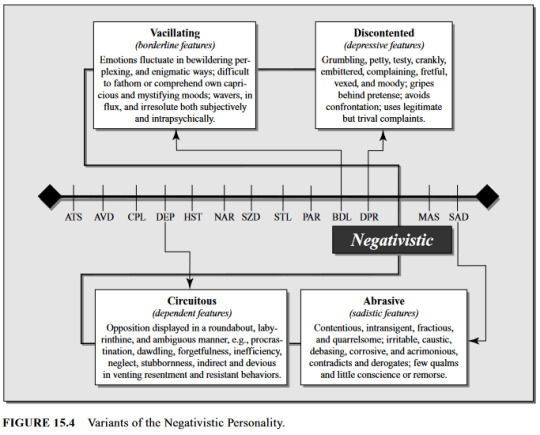
(Millon, ed.).
About PA/NegPD
PA/NegPD is similar to histrionic, dependent, avoidant, depressive, borderline, antisocial, paranoid, masochistic, obsessive-compulsive and narcissistic PDs. It's part of what Millon & Bloom term the "Aggressive Personality Patterns", along with AsPD, NPD, & Sadistic PD.
Renamed Negativistic PD in the DSM-IV; Millon suggested renaming it “oppositional personality disorder” (Lane).
Differential diagnoses include mood disorders, anxiety disorders, somatic disorders, and Oppositional Defiant Disorder. Many children who are diagnosed with ODD will develop PA/NegPD (Millon).
The most common PD comorbidities with PA/NegPD are AvPD (22.78%), AsPD (22.64%), & Sadistic PD (15.36%). The least common was OCPD (0.94%). Less than 1 percent (0.81%) had only ("pure") PA/NEGPD [less than those who had comorbid OCPD] (Millon & Bloom).
Millon defines it on a spectrum from sceptical -> negativistic (Millon Personality Group); or alternatively from discontented [personality type] -> resentful [style] -> negativistic [disorder] (Millon).
In the first DSM, it “... consisted of three subtypes - passive-dependent type who are helpless, overly dependent, and indecisive; passive-aggressive type who express their aggressiveness through passive means like pouting, procrastination, and intentional inefficiency; and the aggressive subtype who react to frustration with irritability, temper tantrums, and overt destructive behaviours” (Coolidge & Segal).
In the DSM-II it was described as being “characterized by passivity and aggression through obstinate behavior, procrastination, stubbornness, and intentional inefficiency” (Coolidge & Segal).
The DSM focuses on its overt/external behaviours and therefore miss its "cardinal qualities"; "underlying the behavior characterizing this personality pattern are profound confusion and ambivalence about self", similar to OCPD but with different coping strategies (Millon & Bloom)
It was a Cluster C PD, but in the DSM-IV & IV-TR it was moved to the Conditions for Further Study section “[d]ue to poor reliability and questionable validity and usefulness” (Coolidge & Segal). It wasn't included in any capacity in later editions.
PA/NegPD has a long history of ‘questionable validity’, as it originated in US military documents about reluctant soldiers during WWII, and continued throughout its history in the various DSMs to have criteria that could theoretically apply to anyone (e.g. dissatisfaction with their job or “personal misfortunes”, feeling misunderstood or unappreciated, complaining too much, etc.) (Lane).
However, Millon says “[s]uch thoughts are normal, but they represent what negativists feel most of the time. To them, every request or expectation feels like a willful imposition. Meeting requests or honoring expectations feels like submission, and meeting demands feels like humiliation” (Millon, ed.).
References
Coolidge, Frederick L., & Segal, Daniel L., ‘Evolution of Personality Disorder Diagnoses in the Diagnostic and Statistical Manual of Mental Disorders’, Clinical Psychology Review, 1998, vol. 18, no. 5, pp. 585-599.
Lane, Christopher, ‘The Surprising History of Passive-Aggressive Personality Disorder’, Theory & Psychology, 2009, vol. 19, no. 1, pp. 55-70.
Millon, Theodore, & Bloom, Caryl, The Millon Inventories, 2008.
Millon, Theodore, Disorders of Personality, 2011.
Millon, Theodore, ed., Personality Disorders in Modern Life, 2004.
'Skeptical / Negativistic Personality', Millon Personality Group, 2015, https://www.millonpersonality.com/theory/diagnostic-taxonomy/negativistic.htm.
#ah yes the anticapitalist/conscientious dissenter disorder!#reading lane's article should be 101 for anyone interested in psych [/DSM] criticism#passive aggressive personality disorder#negativistic personality disorder#personality disorders#pd info#long post#dogpost#cluster c#described#described in alt text#other specified personality disorder#ospd#dsm-iv#dsm-iv-tr#dsm iv#dsm iv tr
10 notes
·
View notes
Text
ghost’s ableism still has no end it seems considering they use ‘narcissist’ as a detractor
i just. ghost i get it you have bpd but that doesn’t make you exempt from being ableist other cluster b pds, which you Have Been and Continue To Be
#i hate ghost and pals part 4743487322795358943904299901471742#also i thought they had ospd/pdnos w bpd avpd and dpd traits but. anyway besides the point#hellchildsbakery.txt
2 notes
·
View notes
Text
Letter: Ipswich, the Dustbowl of the North Shore
Letter: Ipswich, the Dustbowl of the North Shore #IpswichMA
To the Editor:
Remember last summer, when we as a town nearly ran out of water… Again…?
Remember the sight of water spraying onto the new lawns of the 16 or so new homes in the newly deforested stretch of Linebrook Road?
Across the town, toilets were unflushed, laundry piled up and gardens shriveled so those 16 homes would have nice green lawns for the marketing brochures.
Whether that water…
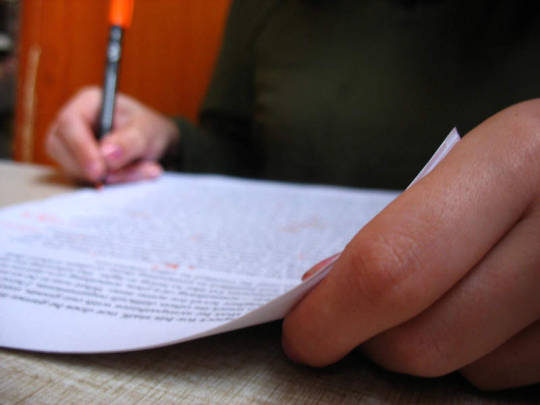
View On WordPress
0 notes
Text
Quinn Walsh for Rafael Garcia's Bachelor Challenge
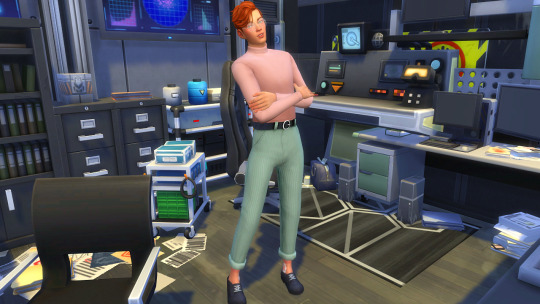
Quinn Walsh, he/him, spellcaster
Traits: geek, goofball, erratic
A spellcaster coming from an ancient bloodline, Quinn soon had to learn how to survive by himself after all his family got killed and he became the only survivor and had to leave Glimmerbrook.
Now he works for the OSPD in the cybercrime departament as a technical analyst (with a little help of his magic), but what no one knows is that he has a side-job as a hacker to find the people who killed his family and seek revenge. People underestimate him because of his sweet and harmless appearance, but unfortunately for them, that's a mistake they only make once.
Since he spent all his teenage years escaping and working hard for his plan, he didn't have a lot of time to date or fall in love, but that doesn't mean he doesn't feel lonely sometimes.
Will someone be able to break Quinn's walls and help him fall in love?
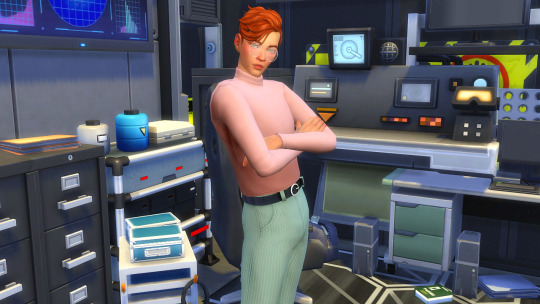

@themotherplant Hope you like Quinn! I had a lot of fun creating him and thinking about a story for him.
18 notes
·
View notes
Text
More sims lots, but this time: dog ones!
↓ slap that keep reading ↓
OSPD K9 Unit
Honestly, I just wanted a reason to go ham with the chainlink fencing. None of the other fencing (I own) seem dog appropriate, but this, aw yiss this!
Obvs can’t use the fence jump or wall/”window” obstacle, but it’s aesthetic is a nice touch to them theme - imo. Rest of the lot contains front office, small vet room, and bathroom. Nothing over the top or fantastic, just built for fun.
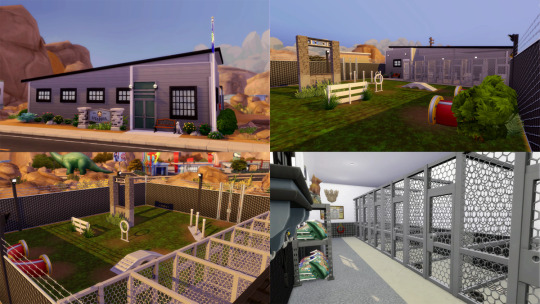
Canine Sports Park
DOCK DIVING! ...even tho the dogs are totally flops when they jump.
Agility course has a judge’s table, there are “doghouses” with beds, pool-pond in the back (would have more of a murky color, but my game was glitching hard and did not want to temp fate to make it Perfect), and picnic area.

These plus a pet store and vet clinic can be found on my gallery - i.d. simxbooth. Hope you all enjoy them! c:
#the sims#ts4#simblr#show us your builds#babble post#do you realize#how many times i had to have my sim#throw the ball into the pool#simply to catch that shot??#so many times#i lost count#idk if my game or console was lagging but it was SOMETHING
10 notes
·
View notes